In The Know | Interview with Zach Woods and Brandon Gardner
While much by way of new adult animation tends to lean into a comfort zone of rigged 2D brashness, this year has seen one of the more interesting additions to the landscape in the form of the six-part stop-motion series In The Know. Equal parts sendup and love letter to the world of National Public Radio, the series follows NPR host Lauren Caspian, “a well-meaning, hypocritical nimrod, just like you and me”, and the eccentric production team of his radio show (also titled In The Know), wherein live-action celebrity guests are interviewed each episode. With echoes of such conceptually disparate shows as I’m Alan Partridge and Space Ghost: Coast to Coast, the series is created by Zach Woods (who voices Lauren and whose own screen credits include Silicon Valley and The Office), Brandon Gardner and animated sitcom veteran Mike Judge (who also contributes his voice talents to his own creation, ‘culture critic’ Sandy) of Beavis and Butt-Head, King of the Hill and Silicon Valley fame.
Joining Woods is a talented cast including Carl Tart (Ground Crew) as overqualified sound engineer Carl, Caitlin Reilly (Loot, Hacks) as put-upon researcher Fabian, Charlie Bushnell (Percy Jackson and The Olympians) as fratboy intern Chase, J. Smith-Cameron (Succession, Rectify) as widowed boomer and co-exec producer Barb, with Mike Judge himself as the voice of hippie/Port Authority sex worker-turned-culture critic Sandy.
With this week seeing the show’s fifth episode ‘Yoghurt Week’ screening in competition at the Annecy International Animation Film Festival as part of the festival’s TV Films programme, Skwigly leapt at the chance to do our best NPR host impersonation and interview co-creators Zach Woods and Brandon Gardner to learn more about this unique and compelling series.
To start at the start, it’d be great to hear how you folks came together having sort of working together came up with the concept for the show.
Zach Woods: I had worked with Mike Judge on Silicon Valley, and he had observed how solidly and deeply I embody the archetype of the obnoxious, over-educated coastal schmuck (he didn’t put it that way, but I could read between the lines). And we’re pals, me and Mike, and he was like “Would you ever want to make a show or you play an NPR host?”, because I also ask people questions a lot, I think because I’m generally curious about people and probably prefer to ask them questions than to be asked questions. So he’d noticed that I have a tendency towards ‘interviewing’ people and that I have the unfortunate affectations of the NPR set, and so he was like “Would you want to do a show where you interview people as an NPR host, and maybe it’s a mix of stop-motion and live-action, because he was a big fan of Space Ghost I know. And so then Brandon and I, who have worked together for a long time, talked about it, and the three of us started fleshing out the world. And that’s that.
I guess for the benefit of our readers outside of the US., can you explain what NPR is, that kind of differentiates it from your common or garden variety of radio?
Brandon Gardner: Yeah, I’d be curious as to what the international comparisons are for it. But in the United States, most media is not public media and it’s very influenced by corporations and profit. And NPR is a sort of magical place in that it’s listener-supported radio. The reputation in the United States, I think, is that it’s sort of a more liberal media source, but also like a gentle, ‘touchy-feely’ way of getting news – but they also have entertainment programs and all sorts of different coverage. And when we were thinking about doing an NPR show and setting it in that world, it’s also sort of a satire, less of NPR itself than of the sort of people who listen to NPR, which is like Zack and myself, and the reputation of people who listen to NPR is often that we’re these sort of progressive do gooders, but at the same time, often in our real lives don’t actually measure up to our professed values.
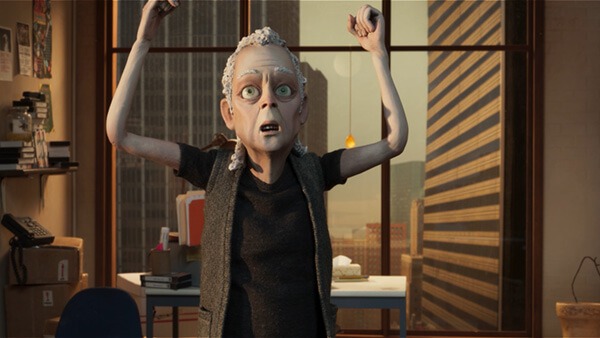
In The Know ™ © 2023 Peacock TV LLC. All Rights Reserved.
Yeah, I was sort of curious if the characters were drawing from life experience, people you knew? Is it mostly then just yourselves ,or aspects of yourselves?
ZW: Another characteristic of people of that particular demographic is narcissism. So of course it is populated solely with versions of us!
BG: I think it’s a mix. I think when Zach and Mike and I were first talking about this show, we were telling stories about ourselves and things we’ve done and also things we’ve witnessed in other people. And then the same thing, when we started our writers room, like one thing we talked a lot about with the writers in what ways we all related to the characters, and who in our lives that we knew that were like the characters – and we tried to borrow as much as we could from us and real people so that it didn’t feel like these two-dimensional stereotypes of a type of liberal person.
I definitely felt a certain connection to Lauren. I’ve been doing podcast interviews for about 12 years, and there are certain temptations, I think, to kind of inject yourself into the narrative of the interviewee or put your own agenda on it (a bit like I’m doing now). I think it’s also kind of multigenerational, there are different age groups that are lambasted, it’s not so much boomers taking a pop at Gen Z or vice versa, it takes shots in every direction.
ZW: That’s so kind.
BG: Yeah, that’s nice that that came across.
ZW: There’s a quote that I think about very often from the actress Cherry Jones, where she said that theater is where we confront each other with our shortcomings; I’ll show you mine, you’ll see yours reflected from the stage. And if all goes well, we’ll have a night of laughs and catharsis and go back out into the night feeling, in some way, comforted. I’m paraphrasing, but I really believe that hypocrisy and being disappointing and morally shabby in instances, those are the things that don’t make you a bad person; it just makes you a person who is sometimes bad, which is all people as far as I know! I mean, I have a limited sample size, but I think rather than trying to make jokes to imply a distance between people like that, and people like us, it’s all people like us, I think. So if you’re saying it doesn’t sort of parse out the losers and the winners, that’s nice, because we don’t want to do that.
Yeah, it sort of feels like everyone’s kind of trying to do their best. And it’s a very interesting confluence of things – it’s a sitcom, it’s kind of a radio show in itself, kind of a magazine show with the interview segments, and you’ve got your workplace politics, the social satire aspects. Most apropos for us would be the stop-motion angle, and obviously Mike Judge has a pretty solid track record with animated sitcoms, was that something he brought to it, or were you all into the idea of having it be animated?
BG: It was his initial idea. He told us that he’d always wanted to do a stop-motion show, that he just loves stop-motion and hadn’t been able to do it yet. And so he brought it up to us as an idea of like “Hey, what do you guys think of this? Would you be interested?”, and we thought about it. I think besides the fact that the show – and I feel that, because I’m not responsible for it, I can say this – is so beautiful, like we just we just love how it looks. But also, when we were first thinking about it, we thought “Oh, stop motion. This is also sort of thematically sort of perfect for our show, that the type of characters we have, with these large heads and fragile bodies, are so well-represented by puppets. I also think, at least in the United States, that when people think of stop-motion, maybe because it’s used in Wes Anderson movies sometimes, that there’s a ‘twee’-ness to the form for people that I think also sort of fits the NPR world.
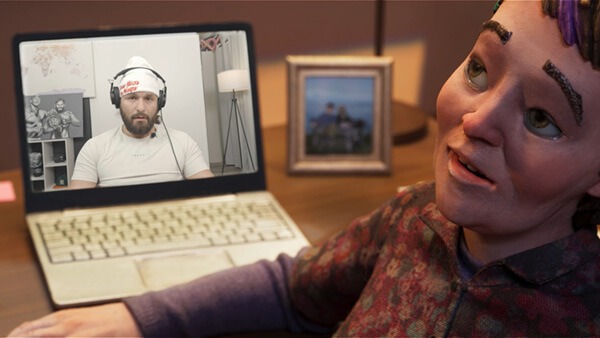
In The Know ™ © 2023 Peacock TV LLC. All Rights Reserved.
You mentioned Space Ghost before, and yeah, that definitely popped into my mind. I was kind of interested in how you actually go about creating those interview scenes. Were they completely ad-libbed?
ZW: Yes, with the exception of the one where Fabian interviews Jorge Masvidal, the cage fighter. That was scripted because it’s basically a narrative arc in the episode. But even in that one, he improvised, I would say probably 50% of what made it to the screen.
BG: A lot of the specifics, yeah.
ZW: And then the only other thing that we ever asked people to fabricate was at one point we said during Tegan and Sara’s interview, we said “Could you please pretend to be nauseous and leave?” But aside from that, everything was improvised.
BG: The beauty of it is that Zach will speak to them in character, where they’re only seeing a picture of the puppet. They’re hearing his voice and he’ll speak to them for about an hour. We have two great editors, but one of them, Kelly Lyon, she would take that hour and find the best three minutes, and also sort of artfully have it feel like one question is leading into the next one organically, even though they might have been separated by 20 minutes in the actual interview.
In general, how do the guests respond when this concept is pitched to them, being interviewed by an animated puppet and, I guess, having to play it as straight as possible? Was everyone’s game for it or was there some resistance?
BG: Everybody who did it, I think, was very game for it. I was sort of amazed by how well all of them just started acting like this was a real interview and didn’t seem uncomfortable with any part of it. Especially some interviews like Mike Tyson and Roxane Gay, where the Lauren characters is bringing up their personal lives so much, they’re so game to go with that and treat him like he’s a real person with real problems. We were like, looking for certain types of guests, like we were asking all these different athletes, and I think a lot of them were a little nervous about what exactly this was, or if we’d be making fun of them. The thing we tried to tell everybody was that the joke would always be on Lauren, and that we just needed them to be themselves.
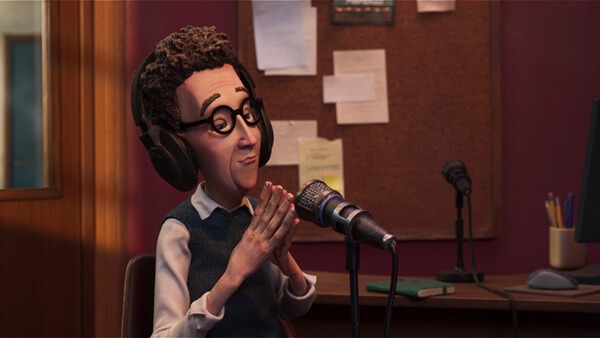
In The Know ™ © 2023 Peacock TV LLC. All Rights Reserved.
The animation as a whole, it’s so strong, and especially considering it’s generally not an action-packed series…
ZW: How dare you, Ben!
BG: It’s not?!
You have so much being communicated with the body language, and they’re really incredible performances, the puppet craftsmanship as well is really nice. It felt, to me, quite different. Was the animation studio Shadow Machine?
ZW: Yeah it was Shadow Machine, and that place is a magic place. If anyone who encounters this interview has a chance to work with Shadow Machine, I highly recommend it. It was all animated in their kind of batcave up in Portland, Oregon, and it’s just all of these people who are such artists, both in the sense that they have cultivated an incredibly difficult technique and craft. And also in terms of their orientation towards the world and their work. No one becomes phenomenally wealthy or famous for being a stop-motion animator, the only reason to do that job is because you love that job. And it requires patience, both in the micro of how animating requires patience, and I have to assume it requires patience in the macro, in terms of finding opportunities where you can actually do it and be solvent in your life. It’s funny, I have friends who are dancers, you know, very talented dancers, and so they remind me of each other in a weird way, the dancers who tour the world doing these incredibly beautiful performances, but are never in pursuit of fame and fortune. It was the same sort of thing with Shadow Machine, and they’re so talented.
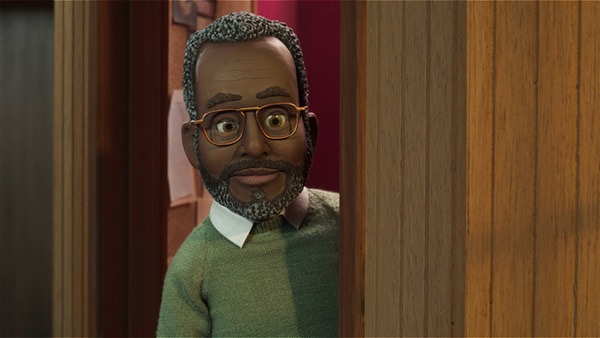
In The Know ™ © 2023 Peacock TV LLC. All Rights Reserved.
Yeah, there are some names in the credits that I was happy to see. The animation director Brian Leif Hansen has an incredible CV – Pinocchio, Laika, My Life as a Courgette was one of my favorite films of the last ten years…
ZW: I’m so glad you brought that up. Truly, I’ve watched that movie like a million times. Céline Sciamma is actually a huge influence on Brandon and me, because she gave this BAFTA talk that really changed the way we write actually. And then they did the American version, which is cool and everything but, at the risk of being like an NPR cliche, it’s like “the French version was better” – but it is! (Laughs).
BG: Yeah, and to just jump off your compliment for Brian, every single shot we talked about with the animator who was animating it, with Brian next to them. We just had so much trust in all the animators, who are all geniuses, and then also in Brian to have ideas that we wouldn’t think of, because we don’t know stop-motion, and sometimes translate what we were going for if we were talking to them as actors. There’s something that, when we first heard it, I was very scared, which is that in stop-motion, you have one take because it’s so time consuming and expensive to reshoot something. You talk to them, they go shoot the scene, then you see it later and that’s the scene, right? Unless something really terrible happened, you have to go with it. And within a few weeks, their work was so consistently amazing I relaxed, and it was like, “Oh, they’ve got it”. A lot of that was how good the individual animators are, but it’s also trusting that Brian’s overseeing everything, and making sure that everything fits together.
ZW: I think this is something that maybe doesn’t get touched on all the time, but it’s so important to shout out when it happens: Brian had such rigorous standards for the quality of the animation, and such passion, but he was also the team leader. And the way he led was so nurturing, where there were the most experienced, seasoned animators, and then there were people who had literally never done it before, professionally. His quiet leadership of people was so humane, and so artistically exciting. I think that is really so important. You know, it’s like a teaching hospital – you’re doing the thing, but you’re also teaching the thing – and he was a great, great leader in that way.
BG: He cares so much about it being as good as possible, but he also has to be the one who has an eye on how quickly they’re moving. I think the one thing when we’ve talked to other animators that do stop-motion and are like “that’s crazy”, is how fast they worked, that they did these six episodes, which I guess is about three hours of of animation, in like eight months. That’s so fast. So he was the one who was both like, nurturing these animators and making sure they’re doing their best work, but also making sure they move quickly and don’t slow down, or else they would run out of money and the show would be over.
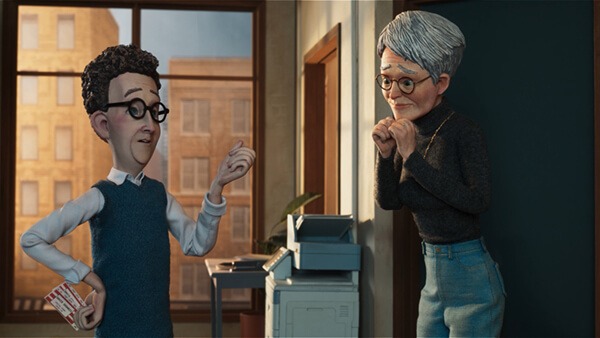
In The Know ™ © 2023 Peacock TV LLC. All Rights Reserved.
Do you plan on doing more with these characters? Another season, maybe, moving forward?
ZW: I don’t know…it takes a long time, it’s the kind of thing where even if we were to start today, it would be a while before they ever appear in any viewable forum. It’s interesting, Brandon and I were talking about it too, that with the election coming, it would be a totally different endeavor. Not a bad one, or a good one necessarily, but different, because it would come out after the election, but you would create it before.
BG: Yes, you’d have to imagine “What will the world look like?” Or what would the United States at least feel like next year? And it’s like, “…I dunno!”
In the Know “Yogurt Week” is screening this week at the Annecy International Animation Film Festival in the TV Films in Competition 5 programme:
The complete series is currently available to watch in the US on Peacock.


